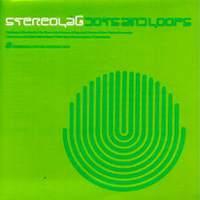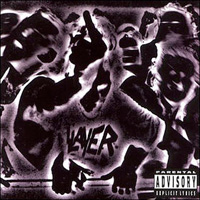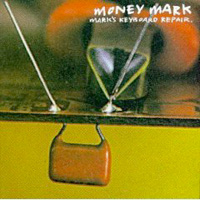 Money Mark
Money Mark
Mark’s Keyboard Repair (Mo Wax/London)
An interview with Money Mark
by Lex Marburger
As I waded through the reversed baseball caps, I couldn’t help but shudder. I’m glad that Beck has actually made it far enough to be in Details, Rolling Stone, and all the rest, but sometimes being able to eat without worrying where the money’s coming from can be a real drag for those of us who actually like the music, rather than the Buzz Clip. These ignorant meat heads (of course, I don’t mean you, gentle reader) probably don’t see the magic that the Dust Brothers and Beck have created on Odelay, they’re just here for “Loser” and “Where It’s At.” Yes, they made it possible for Beck to continue creating his perfect blend of slack over beats. Not that I’m a long standing fan, mind you. I didn’t own Mellow Gold for quite awhile, although I’ve been listening to Odelay almost constantly. But I mourned the fact that these dumb jocks undoubtedly wouldn’t get Money Mark‘s set.
And so it was. Winding his way through the crowd, harmonica in one hand, hand-held amp in the other, Money Mark strolled up to the stage, blowing some crazy riff. Once there, he created all this feedback, and then made melodies and chords out of it! Yeah, it was loud and piercing, but it was amazing as well. All these great sounds came out of the amp, spinning and twisting. Money Mark proceeded to explain to us that all the mess on stage (two tables of equipment, a few keyboards, a drum set) was basically his bedroom, minus his bed, although he showed us how he could sleep on his mixing board if he wanted to. His set consisted of him running around the stage, fiddling with knobs, and having a lot of fun making some very cool funk. Many of the tunes were off of Mark’s Keyboard Repair (Mo’ Wax/London), like the Beastie-sounding “Insects Are All Around Us” (he got a very big guy to play drums along with this one), or the guitar-only version of “Hand In Your Head.” His playful personality was infectious, as he scurried forth and back, wanting to show us everything, not knowing where to start. But when he did play, his focus and intensity carried the songs. I was kind of pissed that people weren’t paying attention to him, because I came to a fundamental conclusion: Money Mark is The Man.
When Beck came on, I was blown away by his dynamic animation and his sheer stage presence. Backed by a tight four-piece band (by the way, the guitarist and bassist do a great impersonation of Devo), he rocked the joint, which led to the inevitable no-brained mosh pit, which even slammed during a solo harmonica number. Fools. Anyway, Beck’s stage show was great. He was doing all sorts of retro ’80s moves, and hamming it up. Halfway through, someone threw a book onstage. It turned out to be a volume of Jim Morrison’s poetry. Beck said, “Hell, I don’t need that!” and burst into an impromptu Morrison-like spiel, “That night… we were on the beach… and I was running through the sand… and my back turned into a snake… skin.” Or something like that. He played the hits, he played some not-so-hits, he rocked. But I couldn’t get my mind off Money Mark. So I called him.
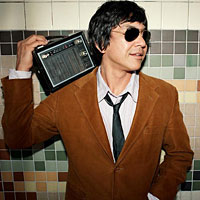 So, where are you?
So, where are you?
I’m in the middle of traffic. I’m on a cell phone, just walking around In Los Angeles, on the East Side. I’m getting turned on by the East Side again.
Mark’s Keyboard Repair has 30 tracks on it, some of which don’t even top the one minute mark. They sound almost like snippets.
I guess, maybe. They’re not pop songs, they don’t fit into that format, but “Happy Birthday to You” is about 45 seconds long, and no one complains about that. It’s a real personal project. I had no real intention of releasing it. It was just stuff I’d been doing in my kitchen, bathroom, bedroom, in my apartment. James Lobell thought I should put it out on Mo’Wax. If it sounds like snippets, maybe it’s because it was just me, by myself, in my bedroom, screwin’ around, doin’ what I do.
It’s not so much that I think they’re incomplete, I just want them to keep going.
Yeah. If you’ve got a sampler, you could extend it. You got a sampler?
Not on me, no.
Oh, okay. Y’know, when Elvis Costello did that Get Happy record, I thought, “man, this guy’s getting right to the point.” That’s what my feelings were. And then, I figured if there was a groove happening, I could just extend it using a computer. So I didn’t really want to bother with extending it live. I’m happy with the length of the songs. I’m caught up with this technology thing, y’know? In t the old days, with moving tape, you’d cut the tape and edit like that. That’s what I originally did when I started recording in the ’70s. I wanted to get to the point of it, and not repeat myself. I’ve been slowly remaking the songs, making them longer. I remade “Hand in Your Head,” I made it a three minute song, and I did that with “Cry,” too. The Dust Brothers remixed it and made it dancier or something. But I use very little technology other than my 8-Track cassette, and most of it is live. If there’re any flaws in it, it’s just the human touch. My real idea was to get away from all these machines that we rely on in our lives. Like, I’m talking to you on a cell phone, utilizing the technology of fiber optics, and all kinds of stuff. I’m trying to get back to the basics. Like in my live set, I’m the only person on stage. I bring my whole bedroom with me onstage. Two tables. I screw around, it’s mostly freestyle, but I play a few songs from the record. I mix and match stuff. I have all this equipment in front of me in my bedroom, and when I wake up in the morning I turn my tape player on and put stuff together out of my dream state. I have this love-hate relationship with my gear. They’re machines, and I can’t talk with them, but I rely on them. You can’t really be too personable with a machine. So when I get a band together, it’ll be much better in that respect.
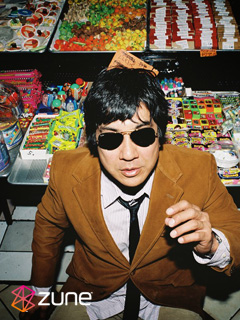 Then again, a band can mouth off to you.
Then again, a band can mouth off to you.
That’s true, see that’s the thing, like, fire the band and get a bunch of robots… But I’m a team player, really. When I’m with Beastie Boys, it’s like a whole other set of things to deal with. There’s a methodology that’s not really apparent in the music. It’s all behind the scenes.
You played all the instruments on Mark’s Keyboard Repair?
Yeah, all 37 of them. I count the keyboards separately, of course. A Hammond is one thing, a clav is another. It’s all analogue, I didn’t use any digital sounds… I did use a Mini Moog, but it’s so ancient, it doesn’t really count. This record is really a defiance to what’s going on in the world. I think new technology is pretty amazing, and then at the same time, I think people are amazing, too, but it’s kind of dehumanizing to have machines playing all the time. There’s a lot of bad machines… Machines that kill people are really fucked up. When people start selling machines, they call people like us “consumers,” but when you buy a TV set, you just throw the old one away. You don’t really “consume” anything. The only thing you consume is food, and that technology kind of scares me, too. Fruits and vegetables and food that you’re eating is like… laboratory food or something. You don’t even know what it is. Technology is wonderful and it scares me at the same time. I don’t ever want to forget that I’m a human being. I mean, I’m here in the street now watching the lights changing, and everyone is on this clock. So many times you get caught up and start acting like a machine, sometimes I have to kick myself in the ass to remember not to become part of the gears. At some point, you have to engage in the social aspect of life, but…
Anyway, I did the project on my own, at my own pace, with no deadline, and I used my friendly machines (the friendly ones are the analogue ones). I mean, these digital ones, you can’t go in and fix. I don’t know how to make a chip, but I know about capacitors; just stick ’em together with a couple of diodes or whatever.
Do you hear a difference between digital and analogue sound?
Theoretically, there shouldn’t be, but when you buy a digital keyboard, you’re relying on those preset sounds. Someone in a lab made this clavinet sound and called it a clav. That’s it. That’s the clavinet. If you haven’t heard a real clavinet, you might think it sounds like a clavinet. But a real clavinet can feedback ’cause it has pickups on it. I don’t know. I’m the old school looking at the new school and wondering about it. It’s not that I’m going back to an old sound, I’m still going forward. I still haven’t found everything a Hammond can’t do, or a B6 Clav, or even a Rhodes. There’s so much more you can do with analogue keyboards. You can put tape on the tines in your Rhodes and mute it, and play it more percussive. With a B6, you can tune the strings, and it has pickups in it, so if you move the amp close, it’ll feedback just like a guitar. It’s wild. Technology has moved so fast that it didn’t give that stuff much time to grow.

